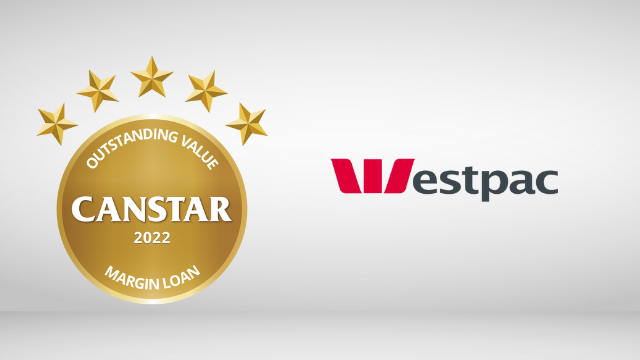5-Star Rated margin loans for 2022 revealed

Canstar has revealed its Margin Loan Star Ratings results for 2022, recognising the products on our database found to offer outstanding value if you are in the market for a margin loan.
A margin loan is a type of loan that allows you to borrow money to invest in products such as shares, exchange-traded-funds (ETFs) and managed funds.
Borrowing to invest through a margin loan is a medium to long-term strategy sometimes used by more experienced investors to grow and diversify their portfolio.
But there are risks to consider, such as the potential to magnify your losses if your investments underperform or you are unable to meet your repayments on the loan.
→ Read more: What is a margin loan and how does it work?
If you have weighed up the pros and cons of margin lending and are confident this strategy is right for you, it may be a good idea to shop around and compare your options to find a loan that will suit your needs and budget.
To help narrow your search, Canstar has analysed the margin loans in its database to determine which ones offer outstanding value to investors.
To discern the winners, the Canstar Research team assessed 11 margin loan products from nine providers, comparing each loan on its interest rates, fees and charges, loan-to-value ratio (LVR), number of shares and funds available and other features such as application channels (e.g. online, through a broker), loan repayment terms and split and switch options.
Products were rated across two consumer profiles:
- Share Investor: people who predominantly invest in the share market
- Managed Funds Investor: people who mainly invest in managed funds and who may use an adviser
In 2022, three products took out a 5-Star Rating for one or both of the consumer profiles, with 5-Star Rated products also being recognised with an Outstanding Value – Margin Loans Award.
Outstanding Value margin loans in 2022
Canstar Research awarded a 5-Star Rating to three margin loan products in 2022. Let’s take a look at why these products received a coveted Canstar 5-Star Rating this year.
Leveraged – Direct Investment Loan

For the fourth year in a row, margin lending specialist Leveraged has been recognised with a 5-Star Rating in the Share Investor profile.
Canstar Research said the low variable and fixed interest rates available on the Direct Investment Loan was one of the primary reasons it was awarded a 5-Star Rating in 2022.
It continued to be the market leader for variable rate loans. Compared to other eligible loans assessed in this rating, Leveraged’s Direct Investment Loan stood out in particular for the low average variable interest rate it offered over a six-month period in the Share Investor profile on $50,000, $250,000 and $500,000 loan amounts.
According to Leveraged, this loan also offers flexible repayment options, no minimum loan amount and no application or establishment fees.
nabtrade – Margin Loan

Nabtrade’s Margin Loan has received a 5-Star Rating in both the Share Investor and the Managed Fund Investor Profiles for the fourth year running.
Canstar Research found this loan offered a balanced product with competitive rates across both variable and fixed rates, as well as market-leading client service and online self-service offering on the feature side.
According to nabtrade, its Margin Loan offers investors access to more than 2,500 ASX listed shares, exchange traded funds, international listed shares, unlisted managed funds, online monitoring and access to a dedicated relationship manager.
Westpac – Online Investment Loan

Westpac’s Online Investment Loan received a 5-Star Rating in both the Share Investor and the Managed Fund Investor profiles for the seventh year in a row.
Canstar Research said the product continued to be the price leader across the Share Investor and the Managed Fund Investor Profiles.
For more information on how margin loans are assessed and what made for a 5-Star Rated product, take a look at the 2022 Margin Loans Star Ratings methodology document. You can also compare margin loans with Canstar to see if you can find one that suits your investment needs.
It’s important to consider the risks
Margin loans in Australia can be subject to a margin call from a lender. This typically happens when the value of the shares used to secure the margin loan fall below a level required by the lender, and it may force the investor to sell some of the shares or deposit extra money to reduce their outstanding loan balance at short notice.
With sudden value fluctuations an ongoing possibility for investors, it’s important to understand the risks involved with taking out a margin loan.
For example, in the three months to the end of March 2020 – at a time when Australian and international share markets experienced significant losses due to the coronavirus pandemic – there was a sharp increase in the number of margin calls, with 7,434 recorded by the Reserve Bank of Australia. For that same period in 2021 the RBA recorded 568 margin calls.
If you’re unsure if a margin loan is right for you, it may be a good idea to speak to a financial adviser and seek further information before committing.
Cover image source: wutzkohphoto/Shutterstock.com
This article was reviewed by our Sub Editor Jacqueline Belesky before it was updated, as part of our fact-checking process.

Michael is an award-winning journalist with more than three decades of experience. As a senior finance journalist at Canstar, Michael wrote more than 100 articles covering superannuation, savings, wealth, life insurance and home loans. His work's been referenced by a number of other finance publications, including Yahoo Finance and The Motley Fool.
Michael's worked as a reporter and producer for the BBC and ABC, including for Australian Story. He's also worked as a feature writer for The Courier-Mail and as a science and technology editor and commissioning editor at The Conversation.
Michael's professional awards include a Queensland Media Award and a highly commended in the Walkleys. In 2021 he was part of a team that was a finalist in the Australian Museum Eureka Prize for Science Journalism. He holds a Bachelor of Science in mathematics and applied physics (Manchester Metropolitan University) and a Masters of Science in pure mathematics (Liverpool University).





